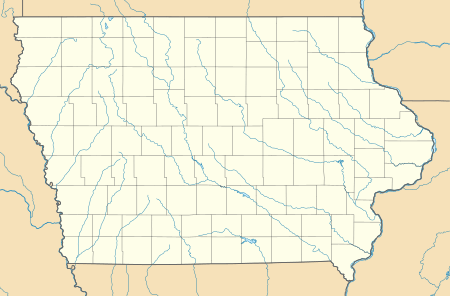Dubuque County Jail
The Dubuque County Jail is a historic building at 36 East 8th Street in Dubuque, Iowa, United States. Completed in 1858, the jail is an example of the uncommon Egyptian Revival style. It is architecturally a highly original work of John F. Rague, who also designed the 1837 Old Capitol of Illinois and the 1840 Territorial Capitol of Iowa.[3] The building was designated a National Historic Landmark for its architecture in 1987. It served as a jail for more than a century, became a museum in 1975, and was converted into county offices in 2016.
Dubuque County Jail | |
.jpg) Dubuque County Jail | |
 | |
| Location | 36 East 8th St. Dubuque, Iowa |
|---|---|
| Coordinates | 42°30′3.74″N 90°39′52.89″W |
| Area | less than one acre |
| Built | 1858 |
| Built by | David Armstrong |
| Architect | Rague & Drake |
| Architectural style | Exotic Revival, Other |
| NRHP reference No. | 72000473 |
| Significant dates | |
| Added to NRHP | June 27, 1972[1] |
| Designated NHL | May 28, 1987[2] |

History
The first Dubuque County, Iowa jail was a stone building nicknamed the "calaboose" built in 1836. It was succeeded by a log building at the corner of 8th and Clay Streets that was intended to be built as a county courthouse. By 1855, it was apparent that a larger structure was needed. On April 1, 1856, citizens of the county voted to approve the construction of the current structure for $40,000. On April 17, the construction contract was awarded to David Armstrong. Rague & Drake designed the structure.[4]
The new county jail was built with blue limestone from Dunleith, Illinois. Completed in 1858, the jail had thirty-two cells and a Sheriff's residence. On June 1, 1874, a six-cell addition was approved for the eastern portion of the building to house female prisoners. It was completed that December for $5,600.[4] The building was used as a jail until 1971.[5]
On June 27, 1972, the building was recognized by the National Park Service with a listing on the National Register of Historic Places. In 1975, the Dubuque Art Association rented the building as a museum. In 1983, the Dubuque County Supervisors extended the lease for twenty more years; this marked the first time that the association had a long-term home.[5] The jail was declared a National Historic Landmark on May 28, 1987.[2][3][6] When the lease expired in 2003, the association moved into a bank building by Washington Park. The Dubuque County Historical Society took over operations, turning the gallery into the Old Jail Museum.[5] The county felt the space was underutilized, and converted it to office space in 2016 for the county medical examiner, I.T. department and veteran's affairs office. the renovation cost $800,000 and maintained and restored much of the original character of the building. [7]
See also
References
- "National Register Information System". National Register of Historic Places. National Park Service. January 23, 2007.
- "Dubuque County Jail". National Historic Landmark summary listing. National Park Service. Archived from the original on 2004-06-18. Retrieved 2007-10-03.
- ""Dubuque County Jail", January 20, 1987, by Ralph J. Christian and Howard Iber" (pdf). National Park Service. p. 19. National Register of Historic Places Inventory-Nomination
- The History of Dubuque County, Iowa. Chicago, IL: Western Historical Company. 1880. p. 405–406.
- http://www.cityofdubuque.org/index.aspx?NID=704
- "Dubuque County Jail--Accompanying 10 photos, exterior and interior, from 1986" (pdf). National Park Service. p. 19. National Register of Historic Places Inventory-Nomination
- Wiedemann, Katie (11 November 2016). "Dubuque County offices move into old jail building". KCRG-TV9. Retrieved 13 November 2016.
External links
| Wikimedia Commons has media related to Dubuque County Jail. |
- County Jail - City of Dubuque
